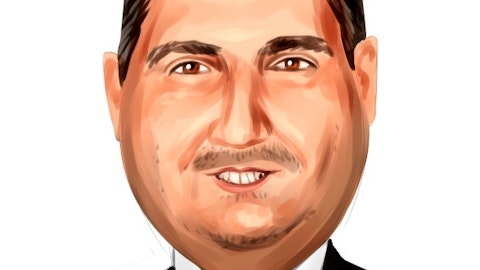In this article we will take a look at the 10 most profitable cash-only businesses to avoid taxes. You can skip our detailed analysis of the changing trends in the payments landscape and go to 5 Most Profitable Cash-Only Businesses To Avoid Taxes.
Technological advancement and convenience have forced cash to give way to electronic transactions as the preferred choice for payments around the world. The rapid growth of this digital economy was accelerated by the onset and wide adoption of the smartphone over the past decade. During the course of the last twelve months, the COVID-19 pandemic has proved to be decidedly transformational for the payments industry. These trends have led to many lofty claims about cash becoming obsolete in a digital world.
However, analysts and commentators often overlook the fact that paper money and coins are still the most popular way of paying for things in many countries around the world. Even as technologists trumpet the benefits of cashless societies, questions about identity and inclusion continue to hold back the wider acceptance of electronic payments. According to a report by the European Central Bank, household cash payments edge other payment methods in the continent, where many countries already have well established online financial services.
Across the world, this is partly a cultural issue. For example, in India, even after the government withdrew certain bank notes and pushed digital payments, the results have been far from satisfactory. Indeed, in many developing and poor nations, the transition to cashless societies comes at the added cost of hidden transaction fees and increased government scrutiny. For small entities seeking to avoid burdensome taxes, cash is still king. Here is a list of cash-only businesses fighting a cashless world by offering great profits and tax avoidance. Let’s start our list of the 10 most profitable cash-only businesses to avoid taxes.

Pixabay/Public Domain
Most Profitable Cash-Only Businesses To Avoid Taxes
10. Nail Salons
Nail Salons are a multi-billion dollar industry where most customers utilizing the services still prefer to pay in cash. According to Statista, a German firm specializing in market and consumer data, the market size of beauty salons, including hair, nail and skincare, was more than $57 billion in the US in 2020 despite the coronavirus pandemic. In a report, Nails Magazine claimed that traditional methods continued to outperform electronic means as the preferred engagement method of clients in most nail salons across the US.
One success story of the salon business is Ulta Beauty (NASDAQ: ULTA). The company has a market cap of more than $19 billion and the shares of the company are surging as the COVID-19 vaccine rollout boosts investor confidence. Ulta Beauty operates many stores in the US and sells cosmetic products, fragrances, and salon services. Well-established and mature companies usually have a market cap of more than $10 billion, and for a business dealing primarily in cash, this translates to handsome profits and lower taxes.
9. Vending Machines
Most of the vending machine business is still cash-only, although the trend may be changing. Valuates Reports, a leading market research firm, has projected that the global vending machine market size will reach close to $8 billion by the middle of this decade. The hectic lifestyle of the modern man is seen as the driving factor behind this growth, as demand for on-the-go snacks and drinks grow exponentially across the world. Vending machines selling items other than food are also fast becoming popular.
Crane Merchandising Systems, a subsidiary of Crane Company (NYSE: CR) is one of the top manufacturers of vending machines globally. The shares of the parent firm have soared after a difficult 2020 and analysts predict the stock will rise further. The business has a market cap of more than $5 billion and more than 11,000 employees. It mostly produces specialized industry equipment. The firm has a fluid handling segment, a payment merchandising segment, and an electronics segment. As far as cash-only businesses go, it is hard to go wrong with Crane Co.
8. Errand Services
Providing services such as grocery shopping and food delivery are increasingly profitable businesses. Indeed, these services often offer a solution to businesses who are struggling to carry out these tasks. In terms of cash flow, these services rake in a lot of money. According to G4S Global, a multinational security services company, more than 70% of e-commerce transactions in Asia are paid with cash. The firm claims that businesses that go cashless risk losing customers. In England, a milk delivery firm has come under fire over online-only plans.
A quick glance at the finances of American technology firm Uber can attest to the profitability of errand services. Uber (NASDAQ: UBER) has a market cap of more than $100 billion and rising stock value. Although Uber primarily operates a ride-hailing business, it also owns a food delivery service by the name of Uber Eats. Over the past year, as ride-hailing profits have plummeted, the food delivery business has witnessed a more than 135% increase in value. In developing economies, where these services are cash-loaded, there is a lot of profit in the trade.
In one of their investor letters, RiverPark Advisors, LLC highlighted a few stocks and Uber Technologies Inc (NYSE:UBER) is one of them. Here is what the fund said:
“UBER was also a strong contributor, as shares rallied following the approval of California’s Proposition 22 by voters, allowing the company’s California-based drivers to remain independent contractors (rather than become more expensive employees). We believe this news is not just about the 10%-15% of Uber’s revenue tied to California, but the influence this will have on other states reassessing driver pay. UBER also reported strong third quarter results with Delivery Gross Bookings growing 135% year-over-year which nearly fully offset a reduction in Mobility Gross Bookings, which were down 50% year over year. Total Gross Bookings for the quarter were down only 10% year over year as compared with down 35% last quarter.
Despite the COVID disruption, UBER remains the undisputed global leader in ride sharing (44% of the Company’s third quarter revenue), with greater than 50% share in every major region in which it operates. The company is also a leader in food delivery (46% of revenue), where it is number one or two in the more than 25 countries in which it operates. We view UBER as more than just ride sharing and food delivery, but also as a global mobility platform with the ability to sell to its more than 100 million users (by comparison, Amazon Prime has 130+ million members) and penetrate new markets of on-demand services, such as grocery delivery, truck brokerage and worker staffing for shift work. At its current $96 billion market capitalization, UBER trades at only 6x next year’s revenue from its two core businesses. Additionally, the company has substantial, seemingly unrecognized, value in its several nascent development businesses and another $12 billion in equity stakes in synergistic businesses around the world.”
7. Laundromats
The laundry industry has posted steady growth down the years as more and more people move to cities and opt for coin laundromats as their destination of choice to wash their clothes. There are no signs that this growth is going to slow down. In fact, as apartment housing becomes the new norm, the laundromat industry is expected to expand. According to Martin Laundry, there are more than 35,000 laundromats in the US alone. These outfits, on average, generate close to $300,000 in cash every year and the industry has a 95% success rate on investment.
Although no one company dominates the laundry market, there are several smaller ones turning steady profits. For example, the former Mac-Gray Corp (NASDAQ: TUC) was the largest supplier of coin-operated laundry services in North America. The company was founded in 1927. In 2013, the CSC Service Group acquired the firm for $524 million. The share prices for the laundromat remained steady over the last few years. In addition to providing services to apartment buildings, the firm also operated in hotels, universities and colleges.
6. Auto Services
Providing car repair and car wash services is a very cash-rich business. By virtue of their model, these setups have to be cash-only because the services they offer require a steady flow of paper money. People across the world own cars to commute, run errands and even take trips outside of the city. It is estimated that an average American spends $800 on vehicle repairs annually, not taking into account regular services like car washes. Paying for these repairs is easiest with cash because interest costs are not incurred.
Amerco (NASDAQ: UHAL) is an auto company primarily operating in the leasing and rental business. It also operates auto repair shops. The firm has a revenue of close to $4 billion and a net income of almost $500 million. The sales growth of the firm has been an impressive 6% and stock prices have been rising along with the numbers. American business publication Forbes reports that the firm is expected to grow for years to come. This cannot be said for most cash-rich businesses in the modern era and makes the firm extra special on the list.
Third Avenue Management in their Q3 2020 investor letter said that they sold some shares of AMERCO (NASDAQ: UHAL) and used the earnings in acquiring a new investment position. Here is what Third Avenue Management has to say about AMERCO in their investor letter:
“During the period, the Fund reduced its exposure to the common stock of AMERCO.– The proceeds from this reduction was primarily used to fund a new investment position.”
Click to continue reading and see the 5 Most Profitable Cash-Only Businesses To Avoid Taxes.
Suggested articles:
- Top 10 Energy Sector Stocks for 2021
- Billionaire Mario Gabelli’s Top 10 Stock Picks
- 15 Fastest-Growing Fintech Companies
Disclosure: None. 10 Most Profitable Cash-Only Businesses To Avoid Taxes is originally published on Insider Monkey.




